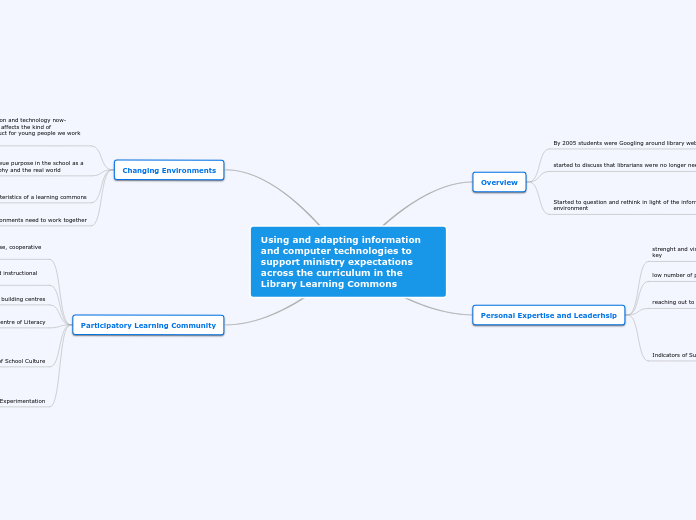Using and adapting information and computer technologies to support ministry expectations across the curriculum in the Library Learning Commons
Participatory Learning Community
Centre of Experimentation
testing of new strategis and technologie sby students and teachers
Centre of School Culture
showcase of school-wide learning
student-driven events, projects, blucbs, and celebrations in both physcial and virtual learning spaces
Centre of Literacy
cross-curricular experiences to support traditional reading, writing, listening, and speacking
knowlege building centres
us of best resources, technologies, spaces, and instructional strategies
inquiry experiences that build personal expertise, cooperative group work, collaborative intelligence
Changing Environments
Physical and virtual environments need to work together
Characteristics of a learning commons
Ownership is replaced to "Access To"
Single teaching space are replaced by mulitple and flexible learning spaces
Quiet is replaced by varying noise and activity levels
a few tired-looking presentation artifacts have been replaced by a plethora of high-and low-tech productions
collaborating, participating, helping
authentic and engaging inquiry and knowledge building
Learning Commons serve a uniwue purpose in the school as a bridge b/w educational philiosophy and the real world
serves school curriculum but also is known as a place for experimenting, playin, making, doing, thinking, collaborating, and growing
it may be the only place in the school where the networks are opne
it may be the only place where students can experiment w/the latest 3D printer
becomes the virtual hub
must be the centre of inquiry, digital citizenship, project-based learning, collaborative intelligence, advanced literacy
Our interperstaions of information and technology now- compared to how it used to be- affects the kind of environment we need to construct for young people we work with
Children and teens know little of top-down edited information
assume the availability of instatntaneous information b/c of their cell phones and smartphones
expect to be commencted on any device, anywhere and anytime
Personal Expertise and Leaderhsip
Indicators of Success
rethink where they are and where they want to be
have a personal learning network
attend conferences
the TLs are gutsy risk takers, disruptive thinkers, change agents with a vision
masters not just of traditional materials
they keep up with technology and lead the push to harness the power of technology to improve teaching and learning
reaching out to other specialized professionals in the school
learning commons staff now include a lead libraria, a reading specialist, a technology-integration specialist, a curriculum specialist, student success teachers, counselors
experts try to reach every teacher in the building
physical and virtual learning commons thrives from a diverse set of professional expertise
low number of professional staff in the library
strenght and vision of the professional doing the transition is key
a quality professional makes all the difference
Changing the name of the space does not make a difference
Overview
Started to question and rethink in light of the information environment
school librarians faced the explosion of information and technology
profession had to reinvent itself
students were reinventing themselves
social networking appeared
realization that tech tools could be switched as new ones appeared overnight
tried to learn what this revolution was all about
started to discuss that librarians were no longer needed
by 2007 school libraries were in trouble
holiding on to school libraries and librarians in education was in jeopardy
By 2005 students were Googling around library webpages
New tech tools were appearning daily
Google Apps for Education was launched

